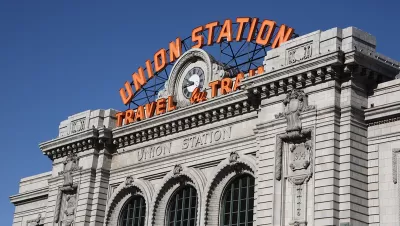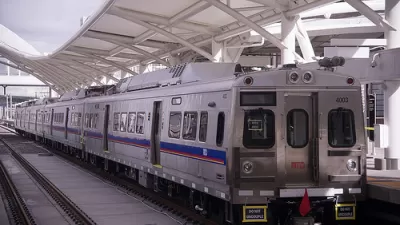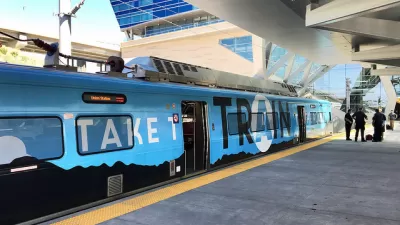You will be forgiven for thinking you are looking at an East Coast commuter rail line: It's electrified with level boarding, mostly 15-minute headways, with bike and luggage racks, operating 22 hours a day from Denver's Union Station to the airport.

Don't look for the "Train to the Plane" at Union Station. Instead, "it goes by name 'RTD University of Colorado A Line', which takes its name as a result of the first sponsorship through the Regional Transportation District's naming rights program," states Monte Whaley of The Denver Post (listen and watch here). During construction, it's referred to as the East Line.
Public-private partnership, cost, rail cars
The highly anticipated line is electric commuter rail, which is part of the Eagle P3 project, the nation's first full public-private partnership for transit.
As a June 2010 Planetizen post on the project indicates, "RTD board voted 13-0 to select a team called Denver Transit Partners, composed of "Fluor Enterprises Inc., Australia's Macquarie Capital Group and transit contractor Balfour Beatty Rail Inc. to build and operate a $2.1 billion portion of FasTracks". They will operate the line for 40 years."
"Local RTD taxes combined with a $1.03 billion federal grant and $450 million from Denver Transit Partners — the 34-year concessionaire that will build, operate and maintain the trains," writes Whaley.
According to an RTD FasTracks fact sheet (pdf) on the electric commuter rail vehicles and service that includes a comparison to light rail, the vehicles will be manufactured by Hyundai Rotem USA which calls them electric multiple units, or EMUs (not to be confused with the Australian ostrich-like bird).
[Note East and West Coast issues that have arisen with Hyundai Rotem commuter rail cars].
Days, hours and frequency of operation; stops and fares
Whaley writes that the fare for the 23-mile, 37-minute trip to the airport from Union Station is $9. RTD's A Line webpage indicates that the seven-day, 22-hour service and frequencies are truly oriented for airport travel:
-
3 - 6 a.m., every dayService every 30 minutes
-
6 a.m. - 8 p.m., every dayService every 15 minutes
-
8 p.m. - 1 a.m., every dayService every 30 minutes
Commuter rail will operate on a zone-based fare. There are seven stations in three zones, plus the airport (DIA) in its own zone, according to the fares page:
RTD indicates that the A Line will bring "train service into new neighborhoods and employment areas along Interstate 70."
With the inception of the new rail service to DIA in April, expect the airport's low accessibility rating to improve.
In addition to the A Line, look for two new electrified commuter rail lines to be opening next year: Gold Line and the first segment of the Northwest Rail. A fourth line will open in 2018.
Hat tip: Annie Dawid.
FULL STORY: RTD announces Union Station-to-DIA rail line will open April 22, 2016

Maui's Vacation Rental Debate Turns Ugly
Verbal attacks, misinformation campaigns and fistfights plague a high-stakes debate to convert thousands of vacation rentals into long-term housing.

Planetizen Federal Action Tracker
A weekly monitor of how Trump’s orders and actions are impacting planners and planning in America.

In Urban Planning, AI Prompting Could be the New Design Thinking
Creativity has long been key to great urban design. What if we see AI as our new creative partner?

Cal Fire Chatbot Fails to Answer Basic Questions
An AI chatbot designed to provide information about wildfires can’t answer questions about evacuation orders, among other problems.

What Happens if Trump Kills Section 8?
The Trump admin aims to slash federal rental aid by nearly half and shift distribution to states. Experts warn this could spike homelessness and destabilize communities nationwide.

Sean Duffy Targets Rainbow Crosswalks in Road Safety Efforts
Despite evidence that colorful crosswalks actually improve intersection safety — and the lack of almost any crosswalks at all on the nation’s most dangerous arterial roads — U.S. Transportation Secretary Duffy is calling on states to remove them.
Urban Design for Planners 1: Software Tools
This six-course series explores essential urban design concepts using open source software and equips planners with the tools they need to participate fully in the urban design process.
Planning for Universal Design
Learn the tools for implementing Universal Design in planning regulations.
Appalachian Highlands Housing Partners
Gallatin County Department of Planning & Community Development
Heyer Gruel & Associates PA
Mpact (founded as Rail~Volution)
City of Camden Redevelopment Agency
City of Astoria
City of Portland
City of Laramie






























